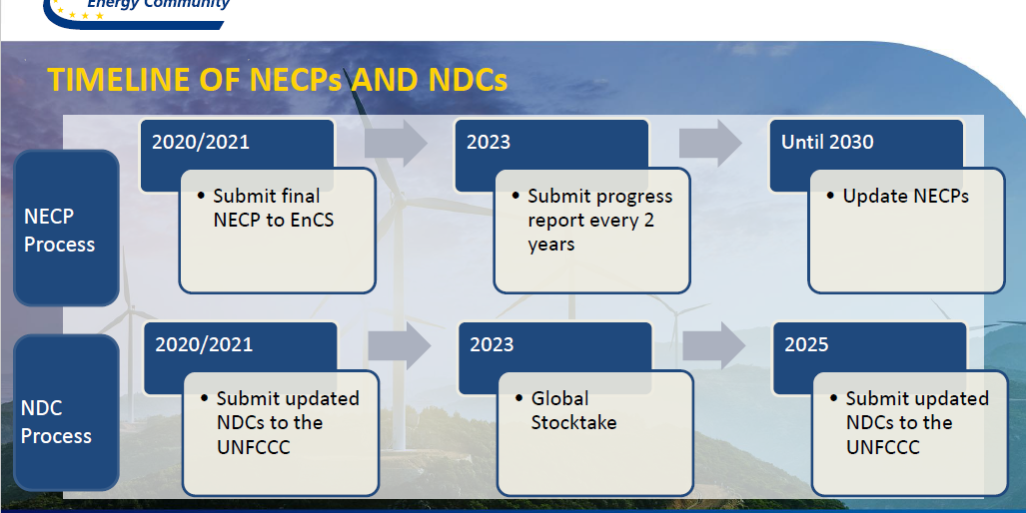“Implementing the nationally determined contributions (NDCs)” online workshop organised by the EU4Climate on April 6-7, 2021 was to carry out an exchange of experiences and theoretical and practical knowledge of examples of the current best worldwide practices in NDC implementation, including gender aspect, NDC financing plans, accounting, reporting, and transparency frameworks.
The state of play of NDC implementation of each EaP country was shared, also the challenges and opportunities that the governments have faced during this process. Furthermore, the exchange of experiences through group discussions on different topics was facilitated.
The European Commission shared the experience of developing the NDC of the European Union and provided an insight into the tools that are being implemented to support and implement climate-related policies, finance, and investment, and to promote and accelerate the transition towards a sustainable and resilient economy in Europe, the EaP countries, and the world.
The NDC of the European Union (how the increase of the ambition of the EU NDC will translate into the EU policies and measures) by Cyril Loisel (DG CLIMA) presented data about the background of the European Green Deal, which seeks to promote sustainable and resilient development in the region. He stated that the EU has already reduced its GHG emissions by a 24% in 2019 compared with 1990 levels.
EU assistance for NDC implementation in the developing countries presented by Joakim Frendin (DG NEAR) remarked the importance of the involvement of the EaP countries and joint efforts to reach regional climate targets. The global status of NDC submission and the way to COP-26 was presented by Taryn Fransen (WRI).
Tugba Icmeli (UNFCCC), presenting Enhanced Transparency Framework and reporting of the NDC implementation mentioned some key principles for NDC accounting: Transparency, Accuracy, Completeness, Comparability, and Consistency (TACCC), environmental integrity, and avoidance of double counting.
The importance of developing effective NDC financing plans was discussed by highlighting the importance of these strategies to be grounded in reality and based on previous sectoral studies and assessments, as well as be aligned with national long-term development plans. Moreover, to ensure that each country’s specific needs are being addressed and reflected in these plans to support their climate roadmaps.
“Developing a financing plan for NDC implementation – best global practices” by Andreas Biermann (EU4Climate international expert) presented an overview of the NDC ecosystem including main actors such as development partners, action plans, and strategies. He addressed how NDC finance strategies should be composed, what they need to provide, and what they need to be. In this sense, he stressed that these strategies must be grounded in reality and be based on previous sectoral studies and assessments, and be aligned with national long-term development plans.
Tibor Schaffhauser’s (the Energy Community) presentation “Integrating NDCs and strategic climate policy planning. Status of NECP development and the reporting requirements” shared the structure of integrated National Energy and Climate Plans (NECP). He remarked that currently, almost all Energy Community member countries have already started their NECPs processes, also that some started to draft the national plans and submitted them to the Secretariat including Georgia, Moldova, and Ukraine from the EaP countries. Also, that the legal basis is also being developed in most contracting parties.
“International experience with integrating gender aspects to NDCs” presented by Fleur Newman (UNFCCC) provided details about the current gender action plan that is pursued by the UNFCCC. According to submitted updated NDCs statistics, 18% of the total past and updated contributions made no reference to gender, 60% increased the reference to gender (no mention of gender in previous NDC), 3% decreased the reference to gender, while 16% increased it, finally, 3% included similar gender references in previous and updated NDC.
“Integrating adaptation in the NDC, case study of Moldova” presented by Ala Druta (expert in adaptation planning), and “Case study of integrating gender considerations to NDC: Belarus” presented by Yulia Popruzhenko (gender expert) offered some key aspects that need to be approached to properly integrate gender into climate policy.
The online workshop was well-attended by 110 participants, including 33 ministerial representatives from EaP countries, the European Commission, and international experts.
All presentations are available here.



